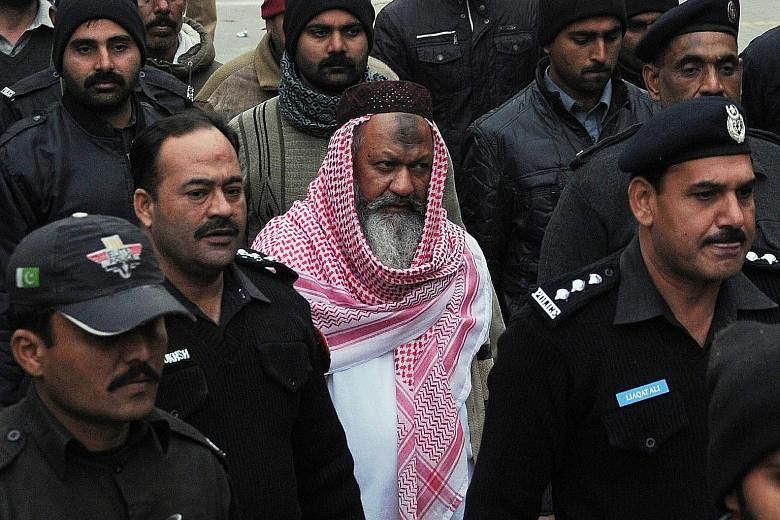ISLAMABAD • The leader of an anti-Shi'ite militant group behind some of Pakistan's worst sectarian attacks was killed in a shoot-out with the police in Punjab province yesterday as his followers sought to break him out from detention, raising the spectre of retaliatory attacks, the authorities said.
Malik Ishaq, head of the Sunni Lashkar-e-Jhangvi (LeJ), was killed with 13 others in a gunfight in the Muzaffargarh district in Punjab, the central province's home minister Shuja Khanzada said yesterday.
The LeJ had plans to carry out violent attacks "on a large scale", he said. Ishaq was on a United States watchlist of terrorists and the group he founded has claimed responsibility for the deaths of hundreds of civilians, mostly minority Shi'ite Muslims.
He had faced several murder trials but had always been acquitted after witnesses refused to testify.
He was arrested again last Saturday, with his two sons, under a public order law.
On Tuesday, the police took Ishaq and his sons to an area near the Punjab province town of Muzaffargarh, where they had seized an arms cache, to identify men they had detained on suspicion of being members of Ishaq's group.
As the police convoy returned in the early hours of yesterday, a group of men on motorcycles ambushed them, freeing Ishaq and his two sons, the police said.
"Twelve to 15 terrorists attacked the police party... freed the accused and fled on motorcycles," a police spokesman, Ms Nabila Ghazanfar, quoted a policeman in the area as saying in a statement.
Police officers farther along the road attacked the gunmen as they were making their escape, killing Ishaq, his two sons, and 11 others, Ms Ghazanfar cited the policemen as saying in her message.
"The accused, in custody, were under investigation for the murder of dozens of people in target killings," a policeman said. "The gang was also in league with the (Taleban) and Al-Qaeda groups operating in the area."
Six police officers were wounded, another senior police official who took part in the encounter said on condition of anonymity.
The circumstances of Ishaq's killing are bound to raise questions because of a long police record of staging such encounters to eliminate suspects.
One senior police investigator not involved in this case said the police often staged such clashes as they did not have faith that the courts would be brave enough to convict high-profile militants for fear of retaliation. The investigator, who declined to be identified, said Ishaq's killing bore the hallmarks of police action under a National Action Plan (NAP) against militancy, launched in December last year after Pakistani Taleban militants killed 134 students at an army-run school in the city of Peshawar.
"This is NAP in action," the investigator said. "State policy on this is indiscriminate and broad-based: terrorists will not be tolerated, no matter who they are or what group they belong to."
Ishaq's killing may lead to retaliatory attacks on civilian targets, said Mr Zafar Nawaz Jaspal, director of the School of Politics and International Relations at Quaid-e-Azam University in Islamabad.
Any violence risks slowing a nascent economic recovery and diverting the army's focus from an anti-terror offensive concentrated on the Afghanistan-Pakistan border. "They may not have capacity to attack the security forces but they could hit soft targets like the Shi'ites," Mr Jaspal said.
BLOOMBERG, AGENCE FRANCE-PRESSE, REUTERS

